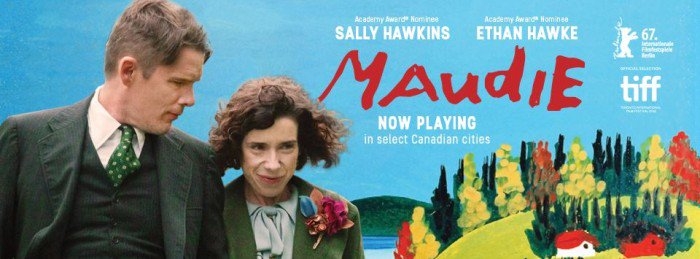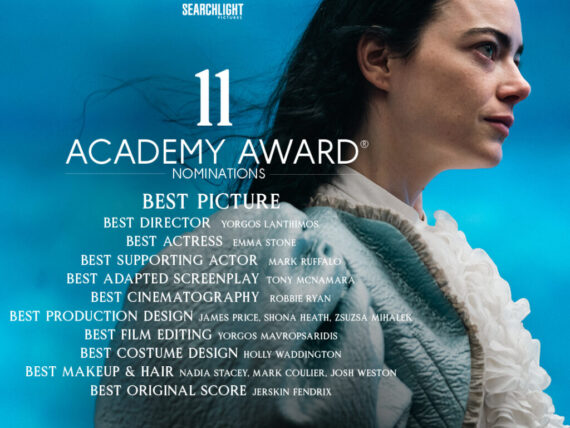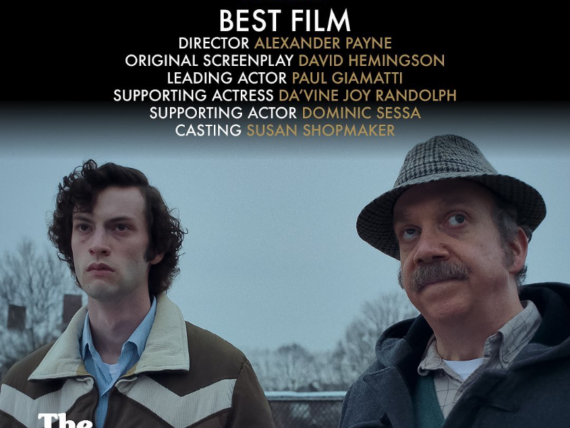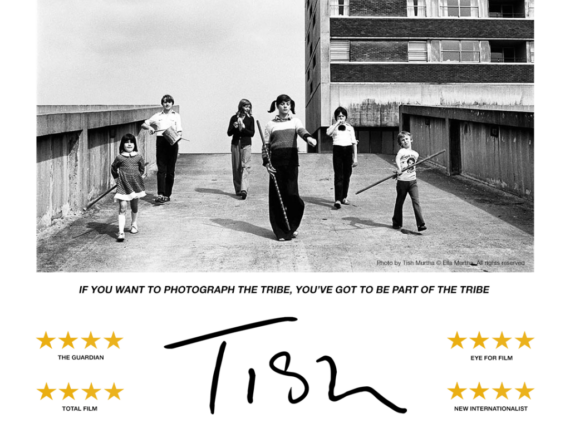With colourful and sophisticated story-telling, Maudie is the story of folk artist Maud Lewis. It is showing in our cinema until Wednesday 4th Oct. Helen Tope reviews.
An impressive biopic, this film excels by challenging what we think we know, and encouraging us to look again.
Based in Nova Scotia, Maud Lewis lived and worked in a one-room house with husband Everett Lewis until her death in 1970. The creator of bold, vibrant paintings, Maud suffered throughout her life from rheumatoid arthritis, a painful condition affecting the joints.
Born in 1903 as Maud Dowley, the artist lived through a time where disabilities awareness had not yet moved into the 20th century. Isolated as a child, Maud was acutely aware of her difference, the arthritis leaving her with a distinctive, stooping gait.
Here we meet Maud as a young woman. Despite all evidence to the contrary, Maud is assumed to be mentally incapable as well, discouraged from seeking employment or independence. Whilst at the local store, Maud (played by Sally Hawkins) watches with interest as local fish-seller Everett Lewis (Ethan Hawke) places an ad for a housekeeper. Determined to break away from her family, Maud snatches the ad and applies for the position. She meets Everett; brusque, mono-syllabic, and a partnership begins to form.
Maud makes herself at home in Everett’s one-room house, taking the drab, unadorned walls as an invitation. She covers the walls, windows and doors with birds, flowers and animals in beautiful, sweeping strokes of colour. Her art spills over into Christmas cards, and paintings. Her work catches the eye of Sylvia, one of Everett’s customers. A well-connected New Yorker, Sylvia spreads the word of her extraordinary discovery.
Forthright and courageous, Maud fashions a life for herself from scraps of board and paint, defying expectations to not only become the breadwinner of her household, but an artist of unmistakable energy and vigour.
A cult figure in her native Canada, Maud Lewis is an artist said to paint without shadows. The buoyant palette of her paintings is in sharp contrast to a film that shows us the bleak reality that surrounded the artist. Treated as the family shame, Lewis’ determination to create a visual narrative joy is all the more remarkable.
Director Aisling Walsh previously worked with Sally Hawkins on the 2005 BBC adaptation of Fingersmith, and called the actor to take on the role of Maud. Walsh, with very little coaxing one suspects, gets a performance from Hawkins that is astonishing. Hawkins has always been a great character study, but in the lead role, she shows us her full hand. Wit crossed with pathos, and often in the blink of an eye, Hawkins delivers a depth of range with the lightest of touch. It is a phenomenal performance by any standard, and champions the story of Maud Lewis with a passion that cannot fail to register with its audience.
Maudie could very easily have been a sentimental film; a folk artist daubing away in the wilds of Nova Scotia. But instead, we are presented with a life that contained as much hardship as colour. A life spent in a one-room house, ill-equipped to deal with Canadian winters, played havoc with Maud’s health, perhaps even hastening her death at 67.
Her marriage to Everett, too, is given to us without gloss or varnish. A difficult man, Lewis’ uneasiness at the changing of their once-traditional roles, is explored in detail. As the irascible Lewis, Ethan Hawke digs down to find the parts of Everett he himself rarely expressed. In a nervy, tightly-wound performance, Everett here is unpredictable, and quick to temper, but also capable of moments of great kindness. It is a portrait that Maud herself would have recognised.
Maudie seeks to re-assert Lewis’ reputation, and makes a compelling case while doing so. Working beyond the expectations placed on her, and in spite of them, Lewis’ work is a triumph of vision over circumstance, and Maudie works because it places the artist, front and centre. Her achievement is exceptional from whatever angle you regard it. But it is the spirit of Maud that lingers. Indomitable, and brimming with optimism, Maudie is art against the odds. It is a skilled piece of story-telling, and genuinely uplifting. With a soaring performance from Sally Hawkins, it deserves to do well at next year’s Oscars. Maudie reminds us that to create art, barriers must first be breached. It is a necessary part of the process, says Maudie, but the rewards make the battle worthwhile.









Comments
Comments are closed.